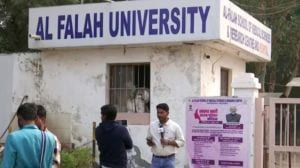Stay updated with the latest - Click here to follow us on Instagram
Battle to head Ambedkars Society nears end in HC
A 36-year-old dispute over the appointment of a successor to lead the Buddhist Society of India (BSI),a national body founded by B R Ambedkar in 1955,may be nearing its end.
A 36-year-old dispute over the appointment of a successor to lead the Buddhist Society of India (BSI),a national body founded by B R Ambedkar in 1955,may be nearing its end. Bombay High Court on Wednesday reserved its judgment in an appeal filed by Ashok Ambedkar,the grand nephew of Dr Ambedkar,against Meeratai,Ambedkars daughter-in-law,in 1987.
While Ashok Ambedkar sought an election for the appointment of trustees and chairman,Meeratai contended that succession should be decided by inheritance. Meeratai is the widow of Ambedkars son Yashwant,and the mother of Bharipa Bahujan Mahasangh (BBM) leader Prakash Ambedkar.
Ashok is the son of Ambedkars nephew Mukund.
The appeal filed by Ashok had challenged an order of the city civil court passed on September 11,1987,that had set aside a scheme approved by the charity commissioner of Mumbai for appointment of trustees and a chairman through election.
It said that the legal battle over the chairmanship of the BSI began after the death of Yashwant on September 17,1977. Meeratai had declared herself the president of BSI by virtue of being the legal successor of Yashwant,it added.
BSI was registered as a society on July 4,1955. After Ambedkars death on December 6,1956,Yashwant took over as its president on June 27,1957.
Ashoks appeal states that BSI was registered under the old constitution and was,therefore,silent on the question of succession or election of its president.
In July 1962,BSI was registered as a public trust. However,this registration too was based on the old constitution.
On October 14,1977,the charity commissioner of Mumbai held that Meeratais election as BSI president was illegal and invalid as the scheme to fill in the president and trustees vacancies was not framed under section 50A of the Bombay Public Trusts Act,1950,the appeal stated.
Meeratai had not contested the charity commissioners finding,senior counsel P Dhakephalkar and lawyer B K Barve who represent Ashok,told the court.
Following the charity commissioners order,Dr S V Ramtekey,the then general secretary of the BSI,on June 4,1980,submitted a new scheme and constitution,which was allowed by the charity commissioner on July 24,1981. This was,however,challenged by Meeratai in the city civil court that ruled in her favour and set aside the scheme on September 11,1987.
Ashoks appeal states that the charity commissioner of Mumbai has the exclusive power to implement a new scheme,and that his order is binding. Meeratai Ambedkar is not at all a trustee of the trust till date,which can be verified from the Schedule 1 of the said registered trust from the record of the chairty commissioner,Mumbai, the appeal states.
Defending his mother,Prakash Ambedkar told the court that the scheme had been framed without jurisdiction and was erroneous.
He argued that Dr Ambedkar had envisaged a fusion between a democratic election and hereditary succession. The Act (BPT Act) is a British Act but it is an Indian religious trust where succession is hereditary, he said.
After the appeal was filed in 1987,the high court asked for status quo to be maintained in the management of BSI. However,both factions have been making conflicting claims that they have been running the trust over the years.







